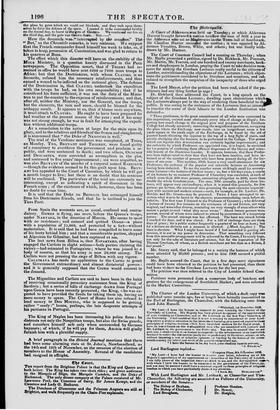ebe Alttropeff.
A Court of Aldermenswas held on Tuesday ; at which Alderman Harmer brought forward'a motion to allow the sum of 8001. a year to the Aldermen who sat as,.Magistrates in the Town-hall of Southwark. Sir Claudius Hunter seconda the motion ; it was opposed by Al- dermen Venables, Brown, White, and others; but was finally with- drawn by Mr. Harmer.
The Court of Common Council had a meeting on Thursday ; whets Mr. Baylis presented a petition, signed by Dr. Birkbeck, Mr. Prescott, Mr. Martin, Mr. Travers, and one hundred and twenty merchants, bank- ers and shopkeepers in London, praying the Court to take decisive mea- sures for making the Gresham Lectures really useful to the citizens of London, notwithstanding the objections of the Lecturers; which objets.. tions the petitioners considered to be frivolous and vexatious, and cal- culated to strengthen the suspicion of the incapacity of those who urged them.
The Lord Mayor, after the petition had been read, asked if the pe- titioners had any thing further to urge ?
Dr. Birkbeck then addressed the Court, in a long speech on the subject of the Gresham Lectures ; dwelling upon obstructions which the Lecturers always put in the way of rendering them beneficial to t public. It was owing to the resistance of the Lecturers that an Utter!) to transfer the scene of their labours to the Loudon Institution was defeated- " Those gentlemen, to the great astonishment of all who were concerned in this negotiation, resisted most obstinately every idea of change as illegal ; for- getting how much change in the original plan arid purposes of the Gresham College had already occurred ; converting the magnificent apartment, occupying the place where the Exchange now stands, into an insignificant room a few yards square in the south angle of the Exchange, to be found by the aid of painted hands directing the inquirer to the top of a long flight of stairs, and greatly abridging also the business to be performed in the College. The power which can legalize this deterioratiou can certainly legalize improvement ; and the authority by which Professors ate appointed can, it is hoped, be exercised for tae purpose of tendering them efficient dispensers of the literary and scies. tific bounty of the illustrious founder. It appears, however, that these Profes- sors have endeavoured to show that they have not been inactive, and have in- formed us of the number of persons who have been present during all the lec- tures of one year. This number, 1900, leaves a very small attendance for six Professors, the audience of the popular and scientific lectures on Astronomy having been deducted. To me the number seems strikingly small for seventy- seven lectures—the lectures of the four terms ; as, but a few days since, a course of six lectures by an eminent l'rofessor of Chemistry was concluded, at each of which more than 600 were present, amounting altogether to 4000, more than double the whole Gresham year. The sum, 7001. annually, paid for these lec- tures, ai!I appear very extraordinary, when it is stated that generally, for .five guineas per lecture, the services of men possessing the most extensive acquaint- ance with ancient and modern science—such, for example, as Dr. Lardner, Dr. Ritchie, and Dr. Grant—may be procured. Twice I have attempted to as- certain what was to be heard in the obscure, unaccommodating room before al- luded to. The first time I listened to the Professor of Geometry; who delivered a lecture of twenty live minutes on the resistance of air and friction, not very original, and somewhat drowsy, reminding inc very strongly of sonic others who mount a pulpit to read what they never wrote.' About twenty persons were present, several of whom were induced to attend by occurrences of a temporary nature. The second attempt was less effectual. The hour was struck before I reached the door, and it was closed. For a bill of exchange there are threa days of grace ; for a public matter frequently a quarter of an hour at least; but for a lecture on divinity not a moment is allowed. (Much laughter.) The time is absolute. What I might have heard if I had succeeded in gaining ad- mission, it is not in my power to determine. That something very different from this miserable arrangement will be achieved by the Court, I fervently hope, not only for the sake of literature and science, but for the reputation of Sir Thomas Gresham, of whom, as a British merchant not less than as a Briton, I feel proud."
Mr. Stacey said, that he belonged to a society the lectures of which were attended by 20,000 persons ; and to him 1900 seemed a pitiful number.
Mr. Baylis assured the Court, that in a few days more signatures could have been obtained to the petition he had presented, than there had been visiters to the Gresham Lectures for the last year.
The petition was then referred to the City of London School Com- mittee.
Petitions were presented from a numerous body of butchers and graziers for the enlargement of Smithfield Market; and were referred to the Market Committee.


























 Previous page
Previous page